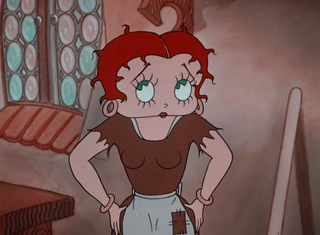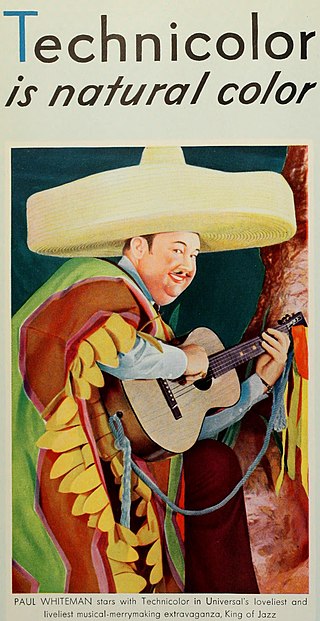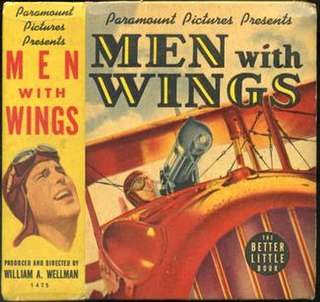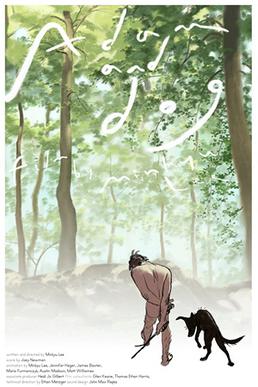Related Research Articles
Silly Symphony is an American animated series of 75 musical short films produced by Walt Disney Productions from 1929 to 1939. As the series name implies, the Silly Symphonies were originally intended as whimsical accompaniments to pieces of music. As such, the films usually did not feature continuing characters, unlike the Mickey Mouse shorts produced by Disney at the same time. The series is notable for its innovation with Technicolor and the multiplane motion picture camera, as well as its introduction of the character Donald Duck, who made his first appearance in the Silly Symphony cartoon The Wise Little Hen in 1934. Seven shorts won the Academy Award for Best Animated Short Film.

Becky Sharp is a 1935 American Technicolor historical drama film directed by Rouben Mamoulian and starring Miriam Hopkins, who plays the eponymous protagonist. She was nominated for the Academy Award for Best Actress. Other supporting cast were William Faversham, Frances Dee, Cedric Hardwicke, Billie Burke, Alison Skipworth, Nigel Bruce, and Alan Mowbray.

Steffi Duna was a Hungarian-born film actress.

Gertrude Maud Barnes, known professionally as Binnie Barnes, was an English actress whose career in films spanned from 1923 to 1973.
Color Rhapsody is a series of usually one-shot animated cartoon shorts produced by Charles Mintz's studio Screen Gems for Columbia Pictures. They were launched in 1934, following the phenomenal success of Walt Disney's Technicolor Silly Symphonies and Warner Bros.' Merrie Melodies. Because of Disney's exclusive rights to the full three strip Technicolor process, Color Rhapsody films were produced in the older two-tone Technicolor process until 1935, when Disney's exclusive contract expired.

Leon Errol was an Australian-American comedian and actor in the United States, popular in the first half of the 20th century for his appearances in vaudeville, on Broadway, and in films.

Color motion picture film refers both to unexposed color photographic film in a format suitable for use in a motion picture camera, and to finished motion picture film, ready for use in a projector, which bears images in color.

Poor Cinderella is a 1934 Fleischer Studios-animated short film featuring Betty Boop. Poor Cinderella was Fleischer Studios' first color film, and the only appearance of Betty Boop in color during the Fleischer era. It was the first Paramount Pictures animated short in color.

Rainbow Parade is a series of 26 animated shorts produced by Van Beuren Studios and distributed to theaters by RKO between 1934 and 1936. This was the only color cartoon series produced by Van Beuren, and the final series of the studio.

Hello Pop! is the third of five short films starring Ted Healy and His Stooges released by Metro-Goldwyn-Mayer on September 16, 1933. A musical-comedy film, the film also featured the Albertina Rasch Dancers and Bonnie Bonnell. The film was considered lost until a 35mm nitrate print was discovered in Australia in January 2013. Stooges Moe Howard, Larry Fine and Curly Howard were billed as "Howard, Fine and Howard."

Vernon Bruce Dent was an American comic actor, who appeared in over 400 films. He co-starred in many short films for Columbia Pictures, frequently as the foil, main antagonist, and an ally to The Three Stooges.

La Cucaracha is a 1934 American short musical film directed by Lloyd Corrigan. The film was designed by Robert Edmond Jones, who was hired by Pioneer Pictures to design the film in a way to show the new full-color Technicolor Process No. 4 at its best. Process No. 4 had been used since 1932, mainly in Walt Disney cartoons. Jock Whitney and his cousin C. V. Whitney, the owners of Pioneer, were also major investors in Technicolor. La Cucaracha was made like a short feature and cost about $65,000. The usual short film at that time cost little more than $15,000 to film.

Hitch-Hike is a 1977 Italian road thriller film co-written and directed by Pasquale Festa Campanile. The film stars Franco Nero and Corinne Cléry as a couple in a troubled marriage, and David Hess as a fugitive who takes them hostage. The musical score was written by Ennio Morricone.

Fig Leaves is a 1926 American silent comedy film directed by Howard Hawks, released by Fox Film Corporation, and starring George O'Brien and Olive Borden. The film had a sequence, a fashion show, that was filmed in 2-strip Technicolor.

Technicolor is a family of color motion picture processes. The first version, Process 1, was introduced in 1916, and improved versions followed over several decades.

Men with Wings is a 1938 American Technicolor war film, directed by William A. Wellman and starring Fred MacMurray, Ray Milland, and Louise Campbell. Donald O'Connor also has a small part as the younger version of MacMurray's character. The two would soon star in the film Sing You Sinners together along with Bing Crosby.

Adam and Dog is a 2011 American animated short film by Minkyu Lee. The film was nominated for Best Animated Short Film for the 85th Academy Awards and won Best Animated Short Subject at the 39th Annie Awards.
Roy Mack, born Leroy McClure, was an American director of film shorts, mostly comedy films, with 205 titles to his credit.
Service with a Smile is a 1934 Vitaphone short comedy film directed by Roy Mack and released by Warner Bros. on July 28, 1934 that was the first live-action film in full color. This film debuted in theaters a few weeks before the Pioneer Pictures film La Cucaracha.
References
- ↑ Webb, Graham (July 10, 2020). Encyclopedia of American Short Films, 1926-1959. McFarland. ISBN 978-1-4766-3926-0.
- ↑ "Technicolor No. IV: Three-strip". Timeline of Historical Film Colors. Retrieved June 13, 2023.
- ↑ "DVD Talk". www.dvdtalk.com. Retrieved June 13, 2023.
- ↑ "Good Morning, Eve!". TVGuide.com. Retrieved June 13, 2023.